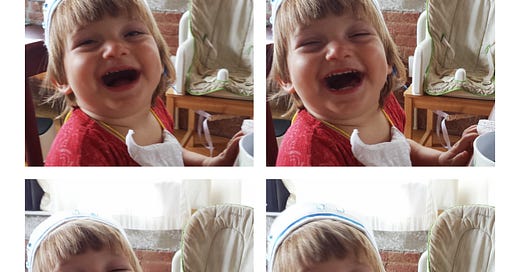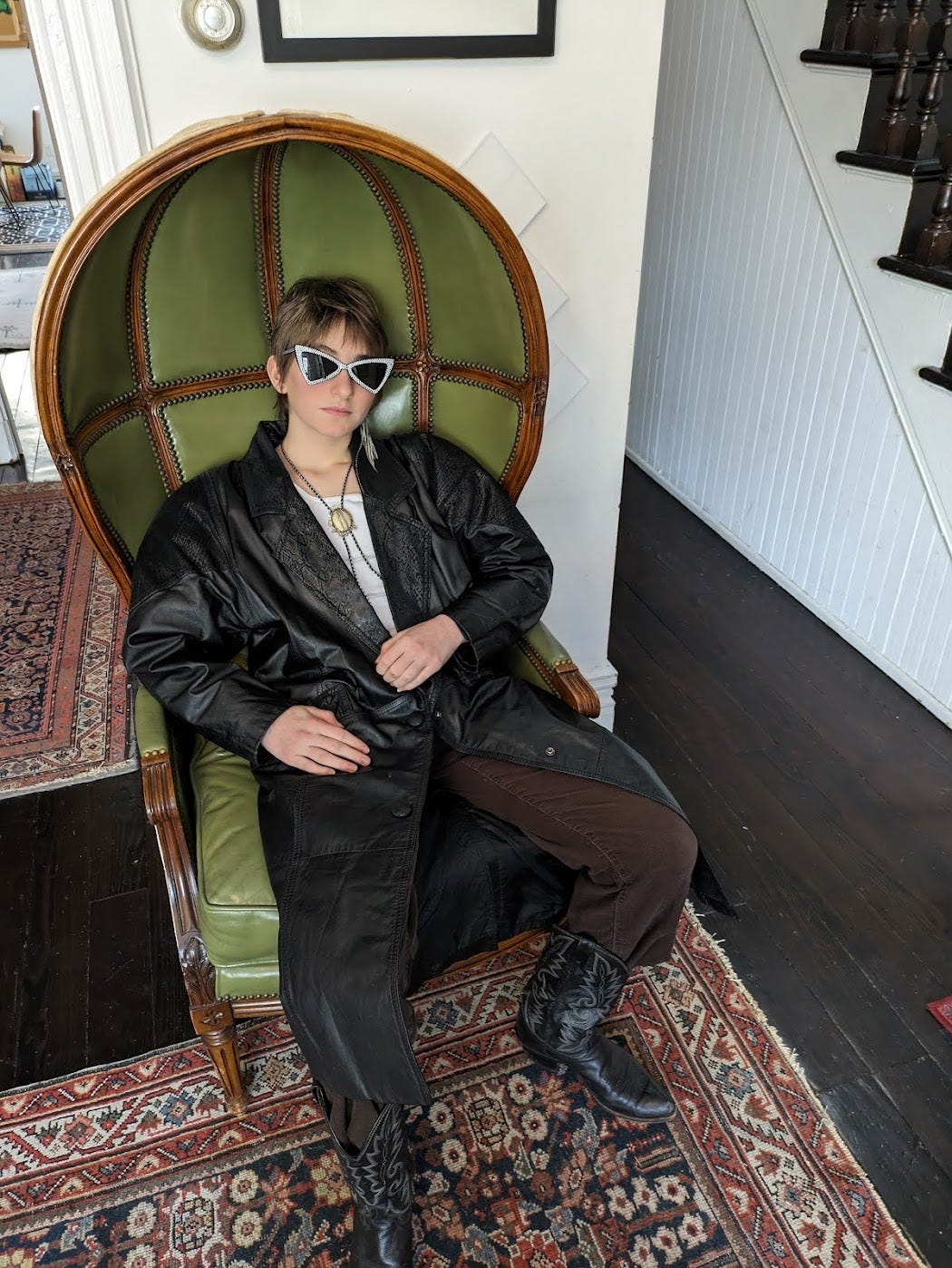Hey Lu.
Happy 13th birthday. Thanks for making me a mom.
Exactly seven days after we buried your grandpa, we were celebrating your birthday, because life is relentless that way.
The Golden Hour is, among other things, a parenting newsletter, so I wanted to take a moment to reflect on what it feels like to be the parent of a teen in the era of Trump 2.0 and post-1.5 degrees.
The trouble is, I don’t know what it’s like to be the parent of a teen. I know what it’s like to be your parent.
Every day you get up at 5 am, make yourself a hot breakfast, pack your lunch, finish up homework over a cup of tea, and leave for the subway by 7, as the rest of the house is getting up. You are kind and patient with your parents and younger sister. Your English teacher told me at parent-teacher conference a couple of weeks ago that you’re “among the top five, or three, or one” writers in your class, at one of the most competitive schools in the city; you have incredibly thoughtful things to say in discussion, and also encourage your classmates’ contributions. You’re similarly “one of the top members of the physical science class… absolutely stellar.”
Your passion is digital illustration, which you got into when your screen time skyrocketed during the pandemic. You design and make amazing costumes.
When I found your clandestine TikTok, it turned out to be dedicated to process videos of your paper sketchbook. You play keyboards with School of Rock, and the kids you jam with every week have formed the basis of a crew that also plays Dungeons and Dragons over Zoom on Friday nights. These kids are polite and sweet to me, raucous and puppyish with each other. Y’all dress in baggy thrift store clothes and Converse and Doc Martens and vaguely Goth makeup. You asked for a record player for your birthday. All these vintage callbacks make me warmly nostalgic.
A lot of this crew prefers different pronouns these days than the ones assigned at birth. The political targeting of non-gender-conforming youth, and the capitulation to that scapegoating by some self-styled Democratic “centrists,” fills me with dread and disgust in equal measure. You all deserve to live into the truth of who you are in peace, and I will do what it takes to preserve that peace.
The truth is, I’m not sure that parenting a teen is a valid concept. Most generalizations about teenagers are bad, as in negative, and also bad, as in wrong.
I’ve spent a lot of my work life thinking about what it’s like to be young in the 21st century, and the ways that older folks are making it harder. My first book, Generation Debt, was about how older generations deploy moral panics and concern trolling to displace their anxieties about the changing world onto young people’s shoulders. By scapegoating youth, the olds are also trying to offload some of their guilt about hoarding so many resources and leaving such a mess behind. Back then, I was on the younger side of the equation.
For DIY U, I read the educational radicals, like Ivan Illich, Paul Goodman, and Seymour Papert, who argued that our children deserve to hold the tools of knowledge-gathering in their own hands. We shouldn’t tell them what to think; we should encourage them in learning how to think.
The Art of Screen Time picked up the moral-panic line. Both there and in The Test, I argued Millennial mothers were sold a bill of goods: told we could perfect our offspring like so many consumer products and equip them to compete in an increasingly anxious and unequal world. This only leads to overparenting norms that steal our kids’ sense of efficacy and self-determination while it burns out their mothers.
I wrote The Stolen Year in the middle of a pandemic while trying to keep you and your sister safe, make sure you were getting enough in-person interaction and physical activity, and while feeling abandoned by every possible institution. Not only did the book chronicle the impact of school closures on kids; I delved into all the ways this country has always failed to put kids at the center—the historic, and often racist, reasons this country lacks the basic elements of a safety net for families, like paid leave, childcare, and a child tax credit, which every other wealthy country has.
I would love to believe that all this accumulated perspective, research, and expert advice helped me raise two kids who are curious, creative, have good friends, are in generally good health, embrace their independence, are loving and appreciative of all they have, and can even empty the dishwasher.
But I can’t take credit. Because I have met many parents in the course of my reporting and my life whose kids are really going through it, and they are just as good at “parenting” as I am. In many cases, better, because they’ve had to be. More patient, more compassionate, more focused, more selfless, more consistent.
Thanks to you and your sister, your dad and I have been doing this thing on easy mode. It’s so much the luck of the draw, and I’m incredibly grateful to you for being the person that you are.
The big thing I’m struggling with right now, as we stare down the barrel of 2025, is a kind of mental block where your future is concerned. In my eyes you are just so wonderful, so full of promise that grows and grows. You’ve messed up and had hard days, and you’ll surely have more, but when I think of any real harm coming to you it’s like that line in The Neverending Story — “When you look at the place, it’s as if you were blind.”
My love for my children has drawn me toward this work contemplating crisis and collapse. And it also operates like a forcefield, shielding me from despair as I contemplate crisis and collapse. I have all these very well-founded fears about the future, which I chronicle here every week, but for you, paradoxically, all I can see is smooth sailing.







This one made me cry! Lu sounds like an incredible person, happy birthday Lu. And I deeply identify with the conflicting emotions that arise from raising awesome kids in a crumbling world. Ooof.
This is so incredibly beautiful: “My love for my children has drawn me toward this work contemplating crisis and collapse. And it also operates like a forcefield, shielding me from despair as I contemplate crisis and collapse. I have all these very well-founded fears about the future, which I chronicle here every week, but for you, paradoxically, all I can see is smooth sailing.”